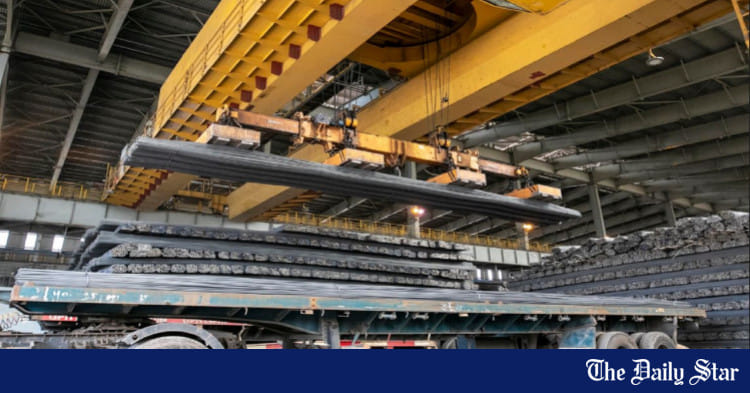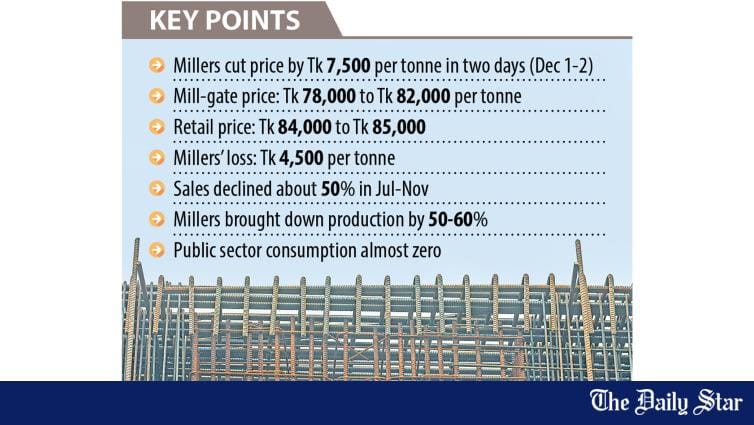Saif
Senior Member
- Joined
- Jan 24, 2024
- Messages
- 17,319
- Likes
- 8,344
- Nation

- Residence

- Axis Group


Steel sector for easing of tariff rules in raw material import
Businesspeople and entrepreneurs on Saturday urged the interim government chief Muhammad Yunus to take necessary steps for simplification of the product tariff process and...
 www.newagebd.net
www.newagebd.net
Steel sector for easing of tariff rules in raw material import
United News of Bangladesh . Dhaka 17 August, 2024, 22:06
Businesspeople and entrepreneurs on Saturday urged the interim government chief Muhammad Yunus to take necessary steps for simplification of the product tariff process and increasing port capacity in importing raw materials and capital machinery for the iron and steel industry.
This call was made in the standing committee meeting of the Federation of Bangladesh Chamber of Commerce and Industry on iron, carbon steel, stainless steel, and re-rolling industry, held at FBCCI’s Motijheel office on Saturday.
Chairman of the standing committee and managing director of Shahriar Steel Mills Limited SK Masudul Alam Masud presided over the meeting.
FBCCI director Md Amir Hossain Noorani was present as the director-in-charge of the committee.
On this occasion, the business leaders stressed urgent action to ensure quality and uninterrupted supply of gas and electricity to all types of industries including the iron and steel industry.
FBCCI president Mahbubul Alam attended the programme virtually as the chief guest.
The iron and steel industry plays a very important role in the infrastructure development of the country, he said.
The FBCCI president urged the businesspeople to unite to eliminate the existing crisis in this industry.
He said, that not only in the steel industry but in all sectors, the tariff process of imported goods is a big challenge.
‘We have been hearing for a long time that the assessment value of imported goods at the port is much higher than the invoice value. We have to work in this field,’ he pointed out.
The FBCCI president also expressed optimism that the current NBR chairman would be sincere in facilitating business in the country.
United News of Bangladesh . Dhaka 17 August, 2024, 22:06
Businesspeople and entrepreneurs on Saturday urged the interim government chief Muhammad Yunus to take necessary steps for simplification of the product tariff process and increasing port capacity in importing raw materials and capital machinery for the iron and steel industry.
This call was made in the standing committee meeting of the Federation of Bangladesh Chamber of Commerce and Industry on iron, carbon steel, stainless steel, and re-rolling industry, held at FBCCI’s Motijheel office on Saturday.
Chairman of the standing committee and managing director of Shahriar Steel Mills Limited SK Masudul Alam Masud presided over the meeting.
FBCCI director Md Amir Hossain Noorani was present as the director-in-charge of the committee.
On this occasion, the business leaders stressed urgent action to ensure quality and uninterrupted supply of gas and electricity to all types of industries including the iron and steel industry.
FBCCI president Mahbubul Alam attended the programme virtually as the chief guest.
The iron and steel industry plays a very important role in the infrastructure development of the country, he said.
The FBCCI president urged the businesspeople to unite to eliminate the existing crisis in this industry.
He said, that not only in the steel industry but in all sectors, the tariff process of imported goods is a big challenge.
‘We have been hearing for a long time that the assessment value of imported goods at the port is much higher than the invoice value. We have to work in this field,’ he pointed out.
The FBCCI president also expressed optimism that the current NBR chairman would be sincere in facilitating business in the country.









































